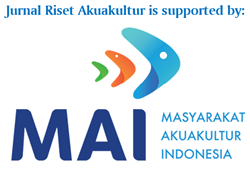PEMANFAATAN MADU UNTUK MENINGKATKAN RESPONS IMUN DAN RESISTANSI UDANG VANAME (Litopenaeus vannamei) TERHADAP INFEKSI White Spot Syndrome Virus
Abstract
Wabah penyakit white spot diseases (WSD) akibat infeksi white spot syndrome virus (WSSV) menyebabkan penurunan produksi udang global. Alternatif pencegahan infeksi WSSV dapat dilakukan melalui peningkatan respons imun udang dengan aplikasi madu sebagai prebiotik. Penelitian ini bertujuan untuk menguji efektivitas pemberian madu dalam meningkatkan respons imun dan resistansi udang vaname (Litopenaeus vannamei) terhadap infeksi WSSV. Penelitian ini terdiri atas lima perlakuan dan tiga ulangan yang meliputi perlakuan kontrol positif (tanpa pemberian madu dan diuji tantang dengan WSSV), kontrol negatif (tanpa pemberian madu dan tanpa uji tantang dengan WSSV), pemberian madu pada dosis 0,2%; 0,4%; dan 0,6%; serta diuji tantang dengan WSSV. Udang vaname berukuran 0,4 ± 0,11 g diberi pakan komersial dengan penambahan madu selama 10 minggu sebelum diuji tantang dengan WSSV, kemudian udang diuji tantang dengan WSSV dan diamati sintasan, serta parameter respons imunnya selama tujuh hari. Hasil penelitian menunjukkan bahwa parameter respons imun udang yang diberi perlakuan madu meliputi total haemocyte count (THC), aktivitas fagositik (AF), respiratory burst (RB), dan phenoloxidase (PO), baik sebelum maupun setelah uji tantang dengan WSSV lebih baik (P<0,05) dibanding kontrol. Pada akhir uji tantang, sintasan udang yang diberi perlakuan madu pada dosis 0,4% dan 0,6% masing-masing mencapai 66,67%; sedangkan pada perlakuan kontrol positif hanya mencapai 36,67%. Hal ini menunjukkan bahwa pemberian madu pada dosis 0,4% efektif meningkatkan respons imun dan resistansi udang vaname terhadap infeksi WSSV.
White spot disease (WSD) outbreaks due to white spot syndrome virus (WSSV) infection cause the decline of the global shrimp production. The alternative prevention method against WSSV infection can be done by the improvement of immune responses through the application of honey as a prebiotic. This study aimed to evaluate the effectiveness of the administration of honey in improving immune responses and resistance of Pacific white shrimp (Litopenaeus vannamei) against WSSV infection. This study consisted of five treatments and triplicates including positive control (without the administration of honey and challenged by WSSV); negative control (without the administration of honey and without the challenge test with WSSV); the administration of honey at doses of 0.2%, 0.4%, and 0,6% and challenged by WSSV. Pacific white shrimp sized 0.4 ± 0.11 g were fed commercial feed with the addition of honey for 10 weeks before challenged by WSSV, then the shrimp were challenged by WSSV and were observed their survival and immune responses parameters for seven days. The results of the study showed that immune responses parameters of the shrimp treated by honey treatments including total haemocyte count (THC), phagocytic activity (PA), respiratory burst (RB), and phenoloxidase (PO), both before and after the challenge test with WSSV were better (P<0.05) compared to control. At the end of the challenge test, the survival of the shrimp treated with honey treatments at doses of 0.4% and 0.6% reached 66.67%, while that of positive control treatment only reached 36.67%. These results indicated that the administration of honey at a dose of 0.4% was effective to improve immune responses and resistance of Pacific white shrimp against WSSV infection.
Keywords
Full Text:
PDFDOI: http://dx.doi.org/10.15578/jra.14.1.2019.59-69

Jurnal Riset Akuakultur is licensed under a Creative Commons Attribution-ShareAlike 4.0 International License.
















